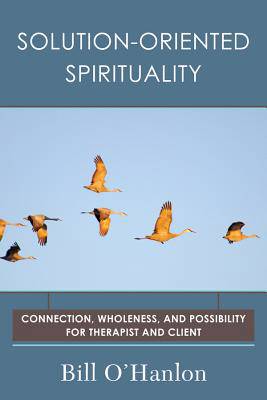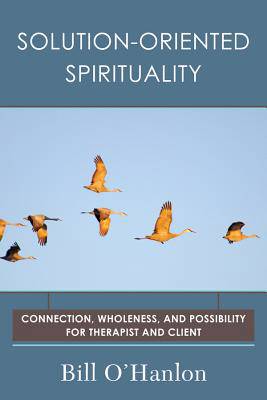
- Afhalen na 1 uur in een winkel met voorraad
- Gratis thuislevering in België vanaf € 30
- Ruim aanbod met 7 miljoen producten
- Afhalen na 1 uur in een winkel met voorraad
- Gratis thuislevering in België vanaf € 30
- Ruim aanbod met 7 miljoen producten
Zoeken
Solution-Oriented Spirituality
Connection, Wholeness, and Possibility for Therapist and Client
Bill O'Hanlon
Paperback | Engels
€ 18,95
+ 37 punten
Omschrijving
Although a growing number of Americans are turning to spirituality to help explain and supplement their lives, and a vast majority identify as religious, psychotherapy has long been reluctant to work alongside clients' sense of "something bigger." But what kind of resources might a spiritual sensibility offer from a mental health standpoint? How can therapists helpfully and respectfully integrate spiritual feelings into their work with clients?
Bestselling author Bill O'Hanlon tackles these questions and others in this pioneering foray into the uses and pitfalls of spiritualities--both secular and religious--in a therapeutic setting. Here, spirituality is defined by its three integral components: a feeling of connection to something beyond oneself, a capacity for compassion or "feeling with," and a sense of responsibility to make a contribution to others and to the world.
Each of these "3 Cs" comes with illustrative anecdotes, case vignettes, and specific techniques for unlocking clients' own spiritual resources. Solution-Oriented Spirituality is O'Hanlon at his best: erudite, conversational, and committed to mining any resource that might help clients get "unstuck" from constrictive behavioral and thought patterns.
Bestselling author Bill O'Hanlon tackles these questions and others in this pioneering foray into the uses and pitfalls of spiritualities--both secular and religious--in a therapeutic setting. Here, spirituality is defined by its three integral components: a feeling of connection to something beyond oneself, a capacity for compassion or "feeling with," and a sense of responsibility to make a contribution to others and to the world.
Each of these "3 Cs" comes with illustrative anecdotes, case vignettes, and specific techniques for unlocking clients' own spiritual resources. Solution-Oriented Spirituality is O'Hanlon at his best: erudite, conversational, and committed to mining any resource that might help clients get "unstuck" from constrictive behavioral and thought patterns.
Specificaties
Betrokkenen
- Auteur(s):
- Uitgeverij:
Inhoud
- Aantal bladzijden:
- 160
- Taal:
- Engels
Eigenschappen
- Productcode (EAN):
- 9780393710625
- Verschijningsdatum:
- 12/01/2015
- Uitvoering:
- Paperback
- Formaat:
- Trade paperback (VS)
- Afmetingen:
- 137 mm x 206 mm
- Gewicht:
- 158 g

Alleen bij Standaard Boekhandel
+ 37 punten op je klantenkaart van Standaard Boekhandel
Beoordelingen
We publiceren alleen reviews die voldoen aan de voorwaarden voor reviews. Bekijk onze voorwaarden voor reviews.











